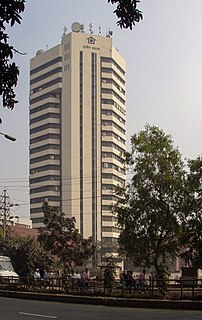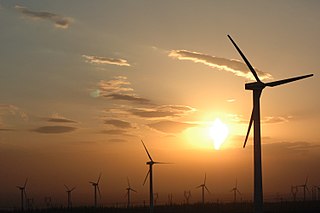Grameen Bank is a microfinance organisation and community development bank founded in Bangladesh. It makes small loans to the impoverished without requiring collateral.

Rural electrification is the process of bringing electrical power to rural and remote areas. Rural communities are suffering from colossal market failures as the national grids fall short of their demand for electricity. As of 2017, over 1 billion people worldwide lack household electric power – 14% of the global population. Electrification typically begins in cities and towns and gradually extends to rural areas, however, this process often runs into obstacles in developing nations. Expanding the national grid is expensive and countries consistently lack the capital to grow their current infrastructure. Additionally, amortizing capital costs to reduce the unit cost of each hook-up is harder to do in lightly populated areas. If countries are able to overcome these obstacles and reach nationwide electrification, rural communities will be able to reap considerable amounts of economic and social development.

Syndicate Bank was one of the oldest and major commercial banks of India. It was founded by Upendra Ananth Pai, T. M. A. Pai and Vaman Srinivas Kudva. At the time of its establishment, the bank was known as Canara Industrial and Banking Syndicate Limited. The bank, along with 13 major commercial banks of India, was nationalised on 19 July 1969, by the Government of India. The Bank was headquartered in the university town of Manipal, India. On 1st April 2020, the bank was merged into Canara Bank.

Canara Bank is one of the largest Indian government owned banks. It is headquartered in Bengaluru. It was established at Mangalore in 1906 by Ammembal Subba Rao Pai and later the government nationalized the bank in 1969. The bank also has offices abroad in London, Hong Kong, Moscow, Shanghai, Dubai, Tanzania and New York. As per the announcement made by the Finance Minister Nirmala Sitharaman on 30 August 2019, Manipal based Syndicate Bank merged with Canara bank on 1 April 2020, making it the fourth largest bank in the country.

The Solar Electric Light Fund (SELF) is a Washington, D.C. based nonprofit whose mission is to design and implement solar energy solutions to assist those living in energy poverty with their economic, educational, health care, and agricultural development. Since 1990, SELF has completed projects in more than 20 countries, using solar energy to power drip irrigation in Benin, health care in Haiti, telemedicine in the Amazon rainforest, online learning in South Africa, and microenterprise development in Nigeria.
Karnataka Bank Limited is India's twelfth largest public sector bank. It is an 'A' Class Scheduled Commercial Bank based in Mangaluru in Karnataka, India. Karnataka Bank Limited has a network of 862 branches, 1,026 ATMs and 454 e-lobbies/mini e-lobbies across 22 states and 2 union territories. It has 8,509 employees and over 11 million customers throughout the country. Its shares are privately owned by over 1,46,000 shareholders. The tagline of the bank is "Your Family Bank Across India".
For solar power, South Asia has the ideal combination of both high solar insolation and a high density of potential customers.

The developing nations of Africa are popular locations for the application of renewable energy technology. Currently, many nations already have small-scale solar, wind, and geothermal devices in operation providing energy to urban and rural populations. These types of energy production are especially useful in remote locations because of the excessive cost of transporting electricity from large-scale power plants. The applications of renewable energy technology has the potential to alleviate many of the problems that face Africans every day, especially if done in a sustainable manner that prioritizes human rights.

The Grameen family of organizations has grown beyond Grameen Bank into a multi-faceted group of profitable and non-profit ventures, established by Muhammad Yunus, the Nobel Peace Prize winning founder of Grameen Bank. Most of these organizations have central offices at the Grameen Bank Complex in Mirpur, Dhaka, Bangladesh. The Grameen Bank started to diversify in the late 1980s when it started attending to unutilized or underutilized fishing ponds, as well as irrigation pumps like deep tubewells. In 1989, these diversified interests started growing into separate organizations, as the fisheries project became Grameen Fisheries Foundation and the irrigation project became Grameen Krishi Foundation.

Renewable energy in developing countries is an increasingly used alternative to fossil fuel energy, as these countries scale up their energy supplies and address energy poverty. Renewable energy technology was once seen as unaffordable for developing countries. However, since 2015, investment in non-hydro renewable energy has been higher in developing countries than in developed countries, and comprised 54% of global renewable energy investment in 2019. The International Energy Agency forecasts that renewable energy will provide the majority of energy supply growth through 2030 in Africa and Central and South America, and 42% of supply growth in China.

A solar lamp also known as solar light or solar lantern, is a lighting system composed of a LED lamp, solar panels, battery, charge controller and there may also be an inverter. The lamp operates on electricity from batteries, charged through the use of solar panel
The Aryavart Bank (AB) is an Indian Government owned Regional Rural Bank (RRB) in Uttar Pradesh established on 1 April 2019. The bank was formed by the amalgamation of Gramin Bank of Aryavart and Allahabad UP Gramin Bank. It currently has 1365 branches and 22 regional offices in rural areas of Uttar Pradesh, around Lucknow. It functions under Regional Rural Banks' Act 1976 and is sponsored by Bank of India.Allahabad UP Gramin Bank and Gramin Bank of Aryavart are mergering with name Aryavart Bank e.r.f 01.04.2019.[1]

India is one of the countries with large production of energy from renewable sources. As of 27 November 2020, 38% of India's installed electricity generation capacity is from renewable sources.

REC Limited, formerly Rural Electrification Corporation Limited, is a public Infrastructure Finance Company in India’s power sector. The company is a Public Sector Undertaking and finances and promotes rural electrification projects across India. The company provides loans to Central/ State Sector Power Utilities in the country, State Electricity Boards, Rural Electric Cooperatives, NGOs and Private Power Developers.
E+Co is a non-governmental organization based in Bloomfield, New Jersey, United States, that from its founding in 1994 to its restructuring in 2012 made over 250 clean energy investments in developing countries. Over these 18 years, E+Co maintained field offices in San Jose, Costa Rica, Bangkok, Thailand, Dar es Salaam, Tanzania and Accra, Ghana. The company's name is pronounced, "E and Co".
Energy use and development in Africa varies widely across the continent, with some African countries exporting energy to neighbors or the global market, while others lack even basic infrastructures or systems to acquire energy. The World Bank has declared 32 of the 48 nations on the continent to be in an energy crisis. Energy development has not kept pace with rising demand in developing regions, placing a large strain on the continent's existing resources over the first decade of the new century. From 2001 to 2005, GDP for over half of the countries in Sub Saharan Africa rose by over 4.5% annually, while generation capacity grew at a rate of 1.2%.

The Appropriate Technology Collaborative is a U.S. Non-profit dedicated to designing everyday technologies for the global poor.

Renewable energy in Afghanistan includes biomass, hydropower, solar, and wind power. Afghanistan is a landlocked country surrounded by five other countries. With a population of less than 35 million people, it is one of the lowest energy consuming countries in relation to a global standing. It holds a spot as one of the countries with a smaller ecological footprint. Hydropower is currently the main source of renewable energy due to Afghanistan's geographical location. Its large mountainous environment facilitates the siting of hydroelectric dams and other facets of hydro energy.
The Karnataka Vikas Grameena Bank (KVGB), an Indian government owned Regional Rural Bank sponsored by Canara Bank. The bank provides retail banking services to rural users and has 628 branches in areas of Karnataka, around North and Western Karnataka.
Concept of Smart villages is a global modern approach for off-grid communities. Vision behind this concept is to assist the policy makers, donors and socio-economic planner for rural electrification worldwide, with special focus on Asian and African countries. Smart villages concept is engaged in efforts to combat the real barriers to energy access in villages, particularly in developing countries with technological, financial and educational methodology. Since 20th Century Electricity has become a vital part of our lives, though we can survive without electricity but cannot progress and enjoy the benefits of science. World's large oil companies have predicted that by 2050, one third of the energy will need to come from Solar, Wind and other renewable resources, therefore adoption of renewable resource in place of fossil fuel is the best approach that can be developed through off-grid systems or communities.











